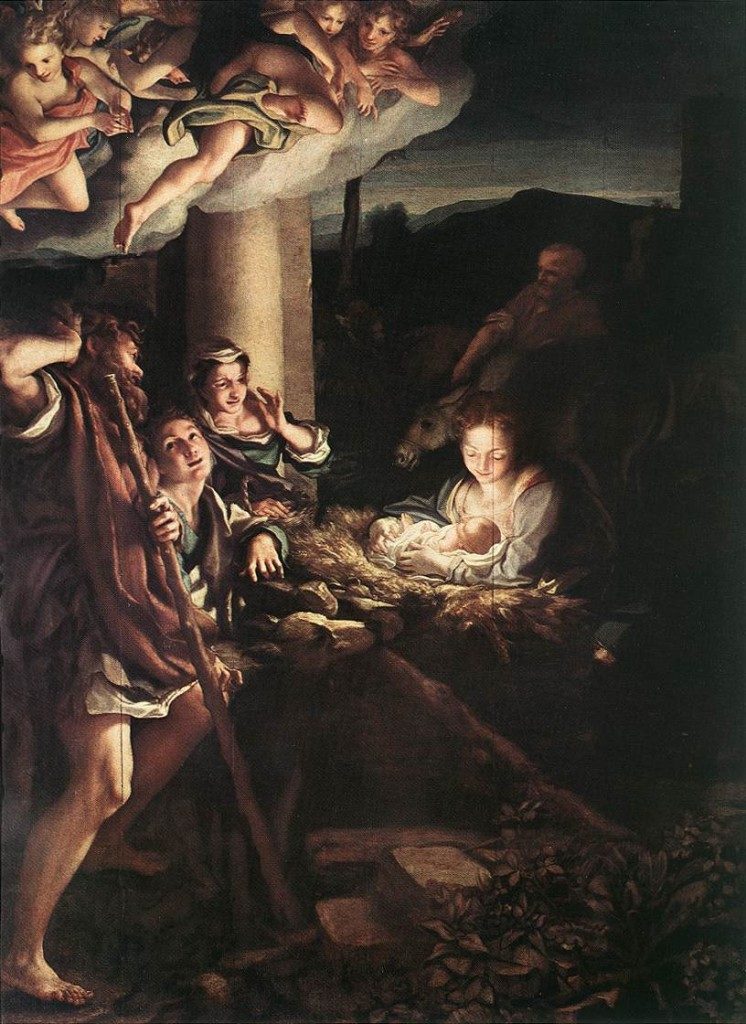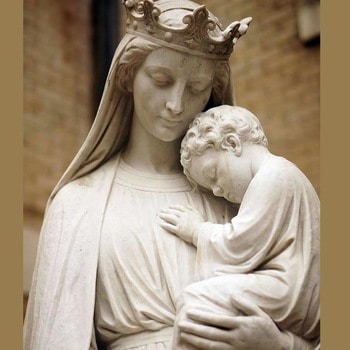Among G.K. Chesterton’s many brilliant aphorisms is the following: “There is a law written in the darkest of the Books of Life, and it is this: If you look at a thing nine hundred and ninety-nine times, you are perfectly safe; if you look at it the thousandth time, you are in frightful danger of seeing it for the first time.”
Chesterton was a great lover of Christmas and wrote numerous poems and essays celebrating this most mystical and poetical of Christian feasts. I have no doubt that he would have agreed with me when I say that Christmas tops the list of those things that many of us have seen countless times, and yet have never truly seen.
Let us consider the barest, historical facts of the matter: God, Whose name is “I AM,” Who created all things, Whom heaven and earth cannot contain, lowered Himself by assuming a human body and sharing in the nature of one of His creatures. He was born as a helpless baby to an unknown and uncelebrated peasant woman, amidst the humblest beasts of burden in a stable in a backwater town belonging to a little-known people, who at the time lay crushed under the thumb of foreign conquerors.

And for what? To live 30 years in near-complete anonymity, engaged in the humblest manual labor, after which He spent a mere three years as a poor, itinerant preacher, a career that was brought to an ignoble and abrupt end through the betrayal of one His closest associates, who handed Him over to a brutal death by one of the most painful and humiliating forms of execution ever devised by man.
These are the barebone historical facts. And if we profess the Christian faith, but are not eternally astonished that such things could ever have happened, it is most likely because we have seen these facts 999 times, and yet have not seen them.
But now, let us go beyond the barebone historical facts. Let us turn our attention towards the meaning of these historical facts. We can do no better than to quote John 3:16: “For God so loved the world that he gave his one and only Son, that whoever believes in him shall not perish but have eternal life.”
God loved the world. He loved the human race! He loved us so much, that He saw fit to become one of us, and, by subjecting Himself to scorn, humiliation, and suffering, to offer us the opportunity to partake of His own life in a state of perfect, loving communion with Him for all eternity. He came, that is, to offer us the gift of salvation.
In his Christmas message in 1959, Pope St. John XXIII marveled at what this fact of Divine condescension says about the dignity of the human race, and every individual human being. “He ‘loved me and gave himself up for me.’ Thus spoke St. Paul to the Galatians (Gal. 2:20). And if God has loved man to such a degree, that indicates that man is of interest to Him and that the human person has an absolute right to be respected.”

Artist: Gerard van Honthorst – The Childhood of Christ
God’s coming to earth in human flesh was and is the greatest affirmation that, whatever the mysteries, messiness, sufferings, and sins that mar human existence in our fallen state, every single human life is endowed with infinite value and dignity, a dignity beyond telling. There is not one among us who is not infinitely precious in God’s sight.
The Rise of Anti-Human Pessimism
It may seem a very curious thing to reference a rather bleak scene from the movie The Matrix in a column about Christmas. But bear with me, and I think you will understand. The scene comes towards the end of the movie, when the villain – Agent Smith – is interrogating the character Morpheus. Morpheus is a leading figure in the last, desperate resistance against the reign of super-intelligent machines, who are ruthlessly exploiting humans to fuel their dystopian society.
Agent Smith, who is himself a super-intelligent computer program, muses on what he has learned about the human race. Contrary to every other mammal on the planet, he says, human beings seem incapable of developing an “equilibrium” with the environment. “You move to an area and you multiply and multiply until every natural resource is consumed and the only way you can survive is to spread to another area,” he says. “There is another organism on this planet that follows the same pattern. Do you know what it is? A virus. Human beings are a disease, a cancer of this planet. You’re a plague and we are the cure.”
Humans are a “plague,” a “virus,” a “disease” and a “cancer”. Where have we heard these sentiments of late? The brilliance of this scene is that it speaks directly to a deep-seated self-loathing that has plagued the human race for as long as humans have pondered the meaning of their existence. It is also a form of radical self-doubt and pessimism that is making a resurgence right now in the form of militant atheism, hedonism, nihilism, and anti-humanism.
Several weeks ago, I wrote about the philosophy of a South African philosopher named David Benetar. Benetar preaches “anti-natalism.” He argues that not only is human life intrinsically meaningless, but that it is essentially harmful, since to live is to suffer, and to suffer is to undergo pain for no reason. For this reason, Benetar thinks it is a moral evil to bring other human beings into the world.
In one way it is remarkable that Benetar’s philosophy should have gained such an audience and such a foothold in a time of unprecedented wealth and comfort, where the sufferings that have long beset human existence have been so dramatically reduced by near-miraculous scientific advancements and growth in wealth. On the other hand, it is not remarkable at all: for we live in an age that has turned our backs on the Gospel message, with the inevitable consequence that we have lost sight of the dignity of the human person.

Child rescued from “baby dumping” in Kenya
And, as Chesterton predicted, the moment we lost sight of the dignity of human existence, we lost sight of the need to respect human rights. How else can we explain the bloody revolutions and genocides in the atheistic regimes of the 20th century, and the growing comfort with eugenics, abortion, and euthanasia in the increasingly secular and apathetic West? As Pope St. John XXIII said in the same Christmas message quoted above: “The disturbances which unsettle the internal peace of nations trace their origins chiefly to this source: that man has been treated almost exclusively as a machine, a piece of merchandise, a worthless cog in some great machine or a mere productive unit.”
The Need for Christmas
Compare the anti-natalist philosophy of Benetar, to the gorgeous ruminations of St. Peter Chrysologus, who spoke so eloquently about Christ’s incarnation and human dignity, and whose writings make an appearance in the Roman breviary around this time of year. I strongly encourage you to read this beautiful quotation in full:
…Why then, man, are you so worthless in your own eyes and yet so precious to God? Why render yourself such dishonor when you are honored by him? Why do you ask how you were created and do not seek to know why you were made? Was not this entire visible universe made for your dwelling? It was for you that the light dispelled the overshadowing gloom; for your sake was the night regulated and the day measured, and for you were the heavens embellished with the varying brilliance of the sun, the moon, and the stars.
The earth was adorned with flowers, groves, and fruit; and the constant marvelous variety of lovely living things was created in the air, the fields, and the seas for you, lest sad solitude destroy the joy of God’s new creation. And the Creator still works to devise things that can add to your glory. He has made you in his image that you might in your person make the invisible Creator present on earth; he has made you his legate, so that the vast empire of the world might have the Lord’s representative. Then in his mercy God assumed what he made in you; he wanted now to be truly manifest in man, just as he had wished to be revealed in man as in an image. Now he would be in reality what he had submitted to be in symbol.
And so Christ is born that by his birth he might restore our nature. He became a child, was fed, and grew that he might inaugurate the one perfect age to remain for ever as he had created it. He supports man that man might no longer fall. And the creature he had formed of earth he now makes heavenly; and what he had endowed with a human soul he now vivifies to become a heavenly spirit. In this way he fully raised man to God, and left in him neither sin, nor death, nor travail, nor pain, nor anything earthly, with the grace of our Lord Christ Jesus, who lives and reigns with the Father in the unity of the Holy Spirit, now and forever, for all the ages of eternity.
Christ, by taking on human flesh and a human nature, has permanently elevated human existence. As St. Pope John Paul II did not tire of repeating: “Christ reveals man to himself.” Christ was God, but also man. And as the perfect, sinless man, He has revealed the heights of dignity for which every human being was intended, and to which he is called. As the Second Vatican Council puts it:

Human nature, by the very fact that it was assumed, not absorbed, in [Christ], has been raised in us also to a dignity beyond compare. For, by his Incarnation, he, the son of God, in a certain way united himself with each man. He worked with human hands, he thought with a human mind. He acted with a human will, and with a human heart he loved. Born of the Virgin Mary, he has truly been made one of us, like to us in all things except sin…
This is marvelous truth contained in the familiar story of Christmas. It may well be we have seen it nine-hundred and ninety-nine times. But let us pray for the grace, this Christmas, to see it for the thousandth time. To really see it. And then let us put our hands to the plow and respond to Christ’s call to preach this Good News to the four corners of the globe.
This entry was posted
on Monday, December 23rd, 2019 at 6:40 pm and is filed under News & Commentary.
You can follow any responses to this entry through the RSS 2.0 feed.
You can skip to the end and leave a response. Pinging is currently not allowed.
Christmas’ Gift and the Dignity of the Human Person
Among G.K. Chesterton’s many brilliant aphorisms is the following: “There is a law written in the darkest of the Books of Life, and it is this: If you look at a thing nine hundred and ninety-nine times, you are perfectly safe; if you look at it the thousandth time, you are in frightful danger of seeing it for the first time.”
Chesterton was a great lover of Christmas and wrote numerous poems and essays celebrating this most mystical and poetical of Christian feasts. I have no doubt that he would have agreed with me when I say that Christmas tops the list of those things that many of us have seen countless times, and yet have never truly seen.
Let us consider the barest, historical facts of the matter: God, Whose name is “I AM,” Who created all things, Whom heaven and earth cannot contain, lowered Himself by assuming a human body and sharing in the nature of one of His creatures. He was born as a helpless baby to an unknown and uncelebrated peasant woman, amidst the humblest beasts of burden in a stable in a backwater town belonging to a little-known people, who at the time lay crushed under the thumb of foreign conquerors.
And for what? To live 30 years in near-complete anonymity, engaged in the humblest manual labor, after which He spent a mere three years as a poor, itinerant preacher, a career that was brought to an ignoble and abrupt end through the betrayal of one His closest associates, who handed Him over to a brutal death by one of the most painful and humiliating forms of execution ever devised by man.
These are the barebone historical facts. And if we profess the Christian faith, but are not eternally astonished that such things could ever have happened, it is most likely because we have seen these facts 999 times, and yet have not seen them.
But now, let us go beyond the barebone historical facts. Let us turn our attention towards the meaning of these historical facts. We can do no better than to quote John 3:16: “For God so loved the world that he gave his one and only Son, that whoever believes in him shall not perish but have eternal life.”
God loved the world. He loved the human race! He loved us so much, that He saw fit to become one of us, and, by subjecting Himself to scorn, humiliation, and suffering, to offer us the opportunity to partake of His own life in a state of perfect, loving communion with Him for all eternity. He came, that is, to offer us the gift of salvation.
In his Christmas message in 1959, Pope St. John XXIII marveled at what this fact of Divine condescension says about the dignity of the human race, and every individual human being. “He ‘loved me and gave himself up for me.’ Thus spoke St. Paul to the Galatians (Gal. 2:20). And if God has loved man to such a degree, that indicates that man is of interest to Him and that the human person has an absolute right to be respected.”
Artist: Gerard van Honthorst – The Childhood of Christ
God’s coming to earth in human flesh was and is the greatest affirmation that, whatever the mysteries, messiness, sufferings, and sins that mar human existence in our fallen state, every single human life is endowed with infinite value and dignity, a dignity beyond telling. There is not one among us who is not infinitely precious in God’s sight.
The Rise of Anti-Human Pessimism
It may seem a very curious thing to reference a rather bleak scene from the movie The Matrix in a column about Christmas. But bear with me, and I think you will understand. The scene comes towards the end of the movie, when the villain – Agent Smith – is interrogating the character Morpheus. Morpheus is a leading figure in the last, desperate resistance against the reign of super-intelligent machines, who are ruthlessly exploiting humans to fuel their dystopian society.
Agent Smith, who is himself a super-intelligent computer program, muses on what he has learned about the human race. Contrary to every other mammal on the planet, he says, human beings seem incapable of developing an “equilibrium” with the environment. “You move to an area and you multiply and multiply until every natural resource is consumed and the only way you can survive is to spread to another area,” he says. “There is another organism on this planet that follows the same pattern. Do you know what it is? A virus. Human beings are a disease, a cancer of this planet. You’re a plague and we are the cure.”
Humans are a “plague,” a “virus,” a “disease” and a “cancer”. Where have we heard these sentiments of late? The brilliance of this scene is that it speaks directly to a deep-seated self-loathing that has plagued the human race for as long as humans have pondered the meaning of their existence. It is also a form of radical self-doubt and pessimism that is making a resurgence right now in the form of militant atheism, hedonism, nihilism, and anti-humanism.
Several weeks ago, I wrote about the philosophy of a South African philosopher named David Benetar. Benetar preaches “anti-natalism.” He argues that not only is human life intrinsically meaningless, but that it is essentially harmful, since to live is to suffer, and to suffer is to undergo pain for no reason. For this reason, Benetar thinks it is a moral evil to bring other human beings into the world.
In one way it is remarkable that Benetar’s philosophy should have gained such an audience and such a foothold in a time of unprecedented wealth and comfort, where the sufferings that have long beset human existence have been so dramatically reduced by near-miraculous scientific advancements and growth in wealth. On the other hand, it is not remarkable at all: for we live in an age that has turned our backs on the Gospel message, with the inevitable consequence that we have lost sight of the dignity of the human person.
Child rescued from “baby dumping” in Kenya
And, as Chesterton predicted, the moment we lost sight of the dignity of human existence, we lost sight of the need to respect human rights. How else can we explain the bloody revolutions and genocides in the atheistic regimes of the 20th century, and the growing comfort with eugenics, abortion, and euthanasia in the increasingly secular and apathetic West? As Pope St. John XXIII said in the same Christmas message quoted above: “The disturbances which unsettle the internal peace of nations trace their origins chiefly to this source: that man has been treated almost exclusively as a machine, a piece of merchandise, a worthless cog in some great machine or a mere productive unit.”
The Need for Christmas
Compare the anti-natalist philosophy of Benetar, to the gorgeous ruminations of St. Peter Chrysologus, who spoke so eloquently about Christ’s incarnation and human dignity, and whose writings make an appearance in the Roman breviary around this time of year. I strongly encourage you to read this beautiful quotation in full:
And so Christ is born that by his birth he might restore our nature. He became a child, was fed, and grew that he might inaugurate the one perfect age to remain for ever as he had created it. He supports man that man might no longer fall. And the creature he had formed of earth he now makes heavenly; and what he had endowed with a human soul he now vivifies to become a heavenly spirit. In this way he fully raised man to God, and left in him neither sin, nor death, nor travail, nor pain, nor anything earthly, with the grace of our Lord Christ Jesus, who lives and reigns with the Father in the unity of the Holy Spirit, now and forever, for all the ages of eternity.
Christ, by taking on human flesh and a human nature, has permanently elevated human existence. As St. Pope John Paul II did not tire of repeating: “Christ reveals man to himself.” Christ was God, but also man. And as the perfect, sinless man, He has revealed the heights of dignity for which every human being was intended, and to which he is called. As the Second Vatican Council puts it:
This is marvelous truth contained in the familiar story of Christmas. It may well be we have seen it nine-hundred and ninety-nine times. But let us pray for the grace, this Christmas, to see it for the thousandth time. To really see it. And then let us put our hands to the plow and respond to Christ’s call to preach this Good News to the four corners of the globe.
This entry was posted on Monday, December 23rd, 2019 at 6:40 pm and is filed under News & Commentary. You can follow any responses to this entry through the RSS 2.0 feed. You can skip to the end and leave a response. Pinging is currently not allowed.